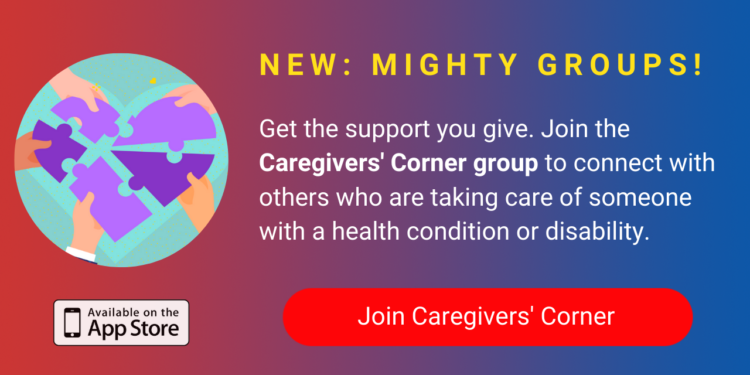In my 20s and 30s, “Until death do us part” seemed an unimaginable length of time. A daunting part of the wedding ceremony I preferred to omit. Which may have been a factor in why my two starter marriages remained brief. But by the time I married a third time at 46, that oath felt sacred and fundamental, a somber reminder there was an endgame within sight and not nearly enough years for me to spend with my Ron.
• The Mighty’s Caregiving Toolkit
Marrying a man 13 years older than me made our time together infinitely precious. It also led me to make assumptions:
1. He was going to retire ahead of me.
2. He’d likely be the first to die.
One good thing about being with an older man is that you remain perpetually the younger woman. He was 70 before I was even 60. I could see what lay ahead through his aches and pains, his cataract surgeries, his growing preoccupation with the malfunction of body parts. Handsome and vital, his age seemed like a cosmic joke no one would ever have believed if I’d been allowed to tell. But sometimes I’d wonder if I would have what it took to be a patient caregiver. (Short answer — no.) There were times I would lie awake imagining the horrific void of a life without him. It seemed a given that one day I’d have to face not knowing where the water shut-off is.
But it turns out that I am the one with the cancer diagnosis. Anal cancer. Likely treatable, but with a long and awful recovery.
Carefree, I had gone alone to see the gastroenterologist for the colonoscopy results. Unresponsive to my jokes, Dr. Dulai remained serious as he closed the office door. I was hit by the words, “squamous cell carcinoma.” As they left his mouth, I noted the moisture in his kind doctor-eyes as my world fragmented. It was August 31, 2019, before Covid-19, so touch was still allowed, and he reached forward and put an awkward hand on my shoulder to moor me.
I made the surreal drive home to do that first awful task: telling Ron. Initially he disappeared, jumping off the couch to go into his office and Google grotesque images I had no desire to ever see. Then, as he emerged from his denial, he came back to the front room and held me. His heart blazed through his sincere blue eyes. “We’re in this together,” he told me.
Together has been the journey of our love and this disease. My gratitude at not doing this alone cannot be measured. What that actually means is almost unfathomable.
When treatment rendered my flesh into raw meat the pain seemed to cut through every opiate that Ron lovingly administered. Sometimes he sat on the bed and we cried together. “I feel so inadequate. I can’t do anything to help you,” he apologized, not understanding that the shared tears were the greatest gift he could have given.
Journeying through chemo and radiation was a descent into a murky hell —delivering my body to be burned and poisoned in the hope of a future promise. At least there was hope. Although through the pain and opiate fog this was not entirely visible to me. Future? I was operating from one bowel movement to the next, dreading any moment away from the bed and bathroom. But each weekday was a car journey requiring clothes, washing, walking — while I could still do that.
When I had to request a wheelchair and my pride and self-efficacy plummeted, Ron was there to push it. His determination had a density that broke my fall into the abyss. I felt his presence surrounding me, steadying me. As if the depth of my pain and despair cut through everything to reveal the solid weave in the fabric of our connection.
“We’ll get through this,” he told me.
“She can’t answer your questions right now,” he told the oncologist.
Sometimes it seemed his will was all that was propelling me forward. Compared to the pain, oblivion looked enticing. But how could I do that to him? Or to my clients, or to the cheery support team on Caring Bridge? My writing group was sending a get-well card each week. I resented the responsibility of staying alive for all the friends and family who loved me. But not for Ron. I’d want him to stay here for me too.
I’m in month four of post-treatment recovery and still only make it out of bed for the afternoons. On a good day. But at least I have stopped blaming a design flaw in my toothbrush for my inability to grasp the handle. It has been most peculiar to have the world join Ron and me in the physical distancing we’ve been practicing since the end of December. As my friend with lupus wanted to say to her neighbor after four weeks of shelter-in-place, “You’ve been stuck inside for a month
and you’re complaining? Welcome to my life.” It’s annoying to hear how bored people are, and what fun they’re having. I would give anything to be well enough to enjoy cleaning out a drawer — even doing my taxes would be satisfying and working would be a dream. But my job is still trying to get my body moving towards better. On the good days I believe I will make it.
Ron still cooks and cleans and braves the pandemic to get groceries more often than I would like. He eventually learned to stop boiling mushrooms and removing every iota of taste. But mostly I have let go of my right to complain about anything. If he is too manly to use a plate (probably wants to avoid washing one more dish) and drops crumbs in a trail from the kitchen to everywhere else, who am I to comment when I’m too weak to push the vacuum cleaner?
When I first saw the scene in Fiddler on the Roof where Golde sings about her domestic chores and then asks, “If that’s not love, what is?” I thought it decidedly unromantic. Not anymore. Ron washing those dishes is romance to the core.
“Until death do us part” doesn’t specify who will outlive whom. It is no longer something I can bear to think about. We will find out soon enough. Meanwhile the everyday business of helping keep one another alive is wealth beyond measure.


